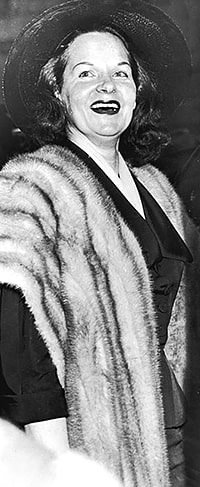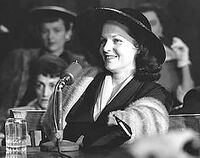Birgit Eckstein
Birgit Eckstein | |
|---|---|
 | |
| Minister of Social Security and Protection of Gylias | |
| In office 2 January 1958 – 5 March 1976 | |
| Prime Minister | Darnan Cyras |
| Personal details | |
| Born | 1 September 1922 Kaşa, Xevden |
| Died | 24 March 1983 (aged 60) Kaşa, Tomes, Gylias |
| Political party | Democratic Communist Party |
Birgit Eckstein (Gylic transcription: Birgit Ekyştain; 1 September 1922 – 24 March 1983) was a Gylian politician. She was Gylias' social security minister in the Darnan Cyras government. She is best known for her role in the creation of Gylias' social security system, and for her hedonistic, "champagne socialist" public image.
Early life
Birgit Eckstein was born on 1 September 1922 in Kaşa. She came from a poor family: her parents worked as menial labourers, and she began working at a young age as well to support the family income.
She was educated through informal schools organised by the Gylian resistance to Xevden, and later voluntary classes in the Free Territories.
After the Liberation War began, she moved with her family north to the Free Territories. She drifted through various jobs, including as a waitress and sex worker, and harboured some hopes of entering the entertainment industry.
Initially not politically active, she joined the Democratic Communist Party and became an assistant to the Freeman sisters. She grew close to the sisters, dispatched throughout the Free Territories as a trusted messenger and source of information. She particularly came under the influence of Unity and Jessica Freeman, which would shape her public image.
Darnan Cyras took notice of her work, and towards the end of the war, asked her to join the post-war Executive Committee to handle the social security portfolio, which she accepted.
Minister of Social Security and Protection
Birgit took office with the rest of the Executive Committee on 2 January 1958. Her post was retroactively renamed "Minister of Social Security and Protection" when the Constitution was adopted in 1961.
She was something of an unusual appointment to the Darnan Cyras government. Unlike the Tōsaka sisters, Akane Tsunemori, or Régine Walras, she had no direct experience relevant to the post. She candidly admitted in early interviews to initially feeling "overwhelmed". She understood her appointment was mainly due to her youth and potential as an attractive "face" and symbol of social security, and undertook her ministerial work accordingly.
Birgit oversaw the creation of the Gylian social security system, through consolidation of public assistance programs inherited from the Free Territories, new programs, and coordination with the vast network of existing cooperative and community organisations. In this capacity, she gained a reputation as the "mother of social security".
She was especially sensitive to symbolism and language. She insisted on universality of programs and a minimum of interference, joking that the ideal system would "give people in need assistance payments and then piss off." She mandated the use of "assistance payments" over other terms like "welfare" or "benefits", which she saw as discriminatory and stigmatising. She was a ferocious opponent of "even the very idea" of means testing, and attacked it with a viciousness that contrasted with her public image, reflecting how important the issue was to her.
Birgit helped set up one of Tyran's most generous and comprehensive system of assistance payments. This was complemented by the institution of public dividends from the profits of public organisations and the GNIF (distributed through national accounts), and non-monetary components, which included: paid annual and parental leave, free school meals and milk, subsidised transportation and housing, free parental classes, and parental packages known as "baby boxes".
The system was funded through the radical economic transformation of the Golden Revolution, particularly through cooperativisation of the economy and high tax rates that helped collapse economic inequality. Birgit's speeches championed decommodification, and she often remarked that civil and political rights were "useless" without economic, social and cultural rights, saying "You can't feed someone with freedom of speech."
Public image
Birgit deliberately cultivated the image of a "good-time girl" in public life, and was described as "one of the most champagne socialist big names of the Golden Revolution". Influenced by fellow minister Neelie op het Mensink, she adopted a distinctive appearance in public, wearing a Levystile skirt suit with a fake fur stole, gloves, and a hat. Neelie joked that "Birgit spent her career waging war on the idea that clothes don't make the person."
Together with Julie Legrand and Eðe Saima, Birgit formed the chahuteuses ("rowdies"), a group in the cabinet famed for their flamboyant personalities and bonne vivante lifestyles. Birgit delighted in portraying herself as a woman about town, dining in cafés and restaurants, carousing in nightclubs, and leading an unabashedly promiscuous sex life. She was described as "the woman who put the party in Democratic Communist Party."
Many contemporaries and biographers commented that the image was both her reaction to her deprived upbringing, and reflecting her genuine fascination with the duality of being both the "mother of social security" and the "life of the party".
She was a popular cabinet minister, although Akane Tsunemori observed that "the public doesn't admire Birgit so much as yearn to spend a night with her" (contrasting her with Rin Tōsaka). Esua Nadel's columns portrayed her with tongue-in-cheek affection, as an "enticingly naughty" minister willing to flirt with "wickedness". She socialised with many prominent figures of Groovy Gylias, including Anaïs Nin, The Beaties and The Watts, and in one infamous instance, with Kaþi Mofat.
Historian Herta Schwamen writes that "if Gylias had a scandal press, Birgit would've been a mainstay." She was treated indulgently by the public and her colleagues as "rather an amiable loose cannon", and press secretary Penelope Morris would occasionally intercede on her behalf with journalists. During the 1969 federal election, she cheerfully admitted that she preferenced the LSD Party first, and expressed hope they would enter Parliament.
Cabinet members made a running joke out of her being "fashionably late" to cabinet meetings and the company she kept. In a 1969 meeting, Aliska Géza joked that Birgit would want Sabina Amorosi appointed minister without portfolio, to which Birgit laughed and replied, "Only because Rauna is busy."
Beneath her larger-than-life public image, Birgit was sincerely devoted to the cause of social protection, and was an effective and resolute advocate of social security programs. Her public image caused many of her opponents to underestimate her. She brooked no criticism of social security, and would counter-attack aggressively that critics wanted to destroy social security and return to the misery of Xevden.
She once summarised her philosophy as, "Social security can never fail. It can only be failed."
Later life and death
Birgit lost her cabinet position with the arrival of the Aén Ďanez government, but remained a member of the Chamber of Deputies, representing Kaşa. Her last term as Deputy was a gradual comedown from the highs of her ministerial office, and her public profile gradually diminished.
She underwent rehabilitation for alcohol addiction in 1978, and quit drinking entirely. She spoke less in the Chamber of Deputies, and her contributions became more rambling.
She lost re-election in 1980, falling from 4th to 15th place in the first count. Although she had been critical of Aén's premiership, she was one of the high-profile Progressive Alliance legislators targeted for defeat by the People Power-Citizens' Movement in response to their coalition with the Revolutionary Rally.
She died of an overdose of sleeping pills on 24 March 1983 in her apartment in Kaşa. It was not established whether the overdose was suicide or accidental. She was cremated and buried in Kaşa.
Legacy
Birgit is remembered as one of the significant figures of the Golden Revolution. As the "mother of social security", she was instrumental in overseeing the establishment of Gylias' social security system and its acceptance as part of the Gylian consensus.
The universality and comprehensiveness of social security she insisted on secured broad-based public support, while her popularity deterred mainstream factions from attacking "Birgit's baby", lest they be perceived as enemies of the Golden Revolution.
Birgit is also remembered for her public image, which made her a style icon and something of a sex symbol. She contributed to Gylian political culture by helping create the archetype for the "substance and a show" politician. She was able to both take her duties seriously, becoming a successful minister, and simultaneously cultivate an image memorably at odds with it, unlike other politicians whose images complemented their message.
This helped pave the way for similarly successful and eccentric politicians, ranging from Nancy Cowell to Hilda Wechsler, from the ARENA to the LND and PPFN.
Birgit's persona, as with her chahuteuse colleagues, remains influential in Gylian pop culture, being frequently imitated, parodied, or cited as an inspiration for fictional characters.
Private life
Birgit married Hans Hauser, a ski instructor, in 1956. The couple had one child.
Throughout her career, she had "numerous" one-night stands and other romantic encounters. Hans was uncomfortable with her flamboyant lifestyle, and kept a low profile.

